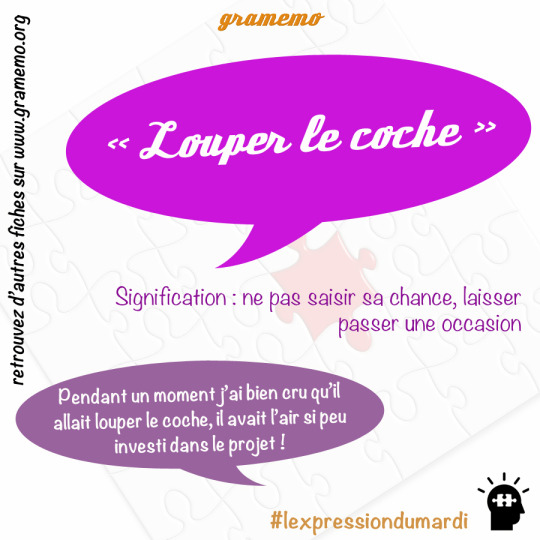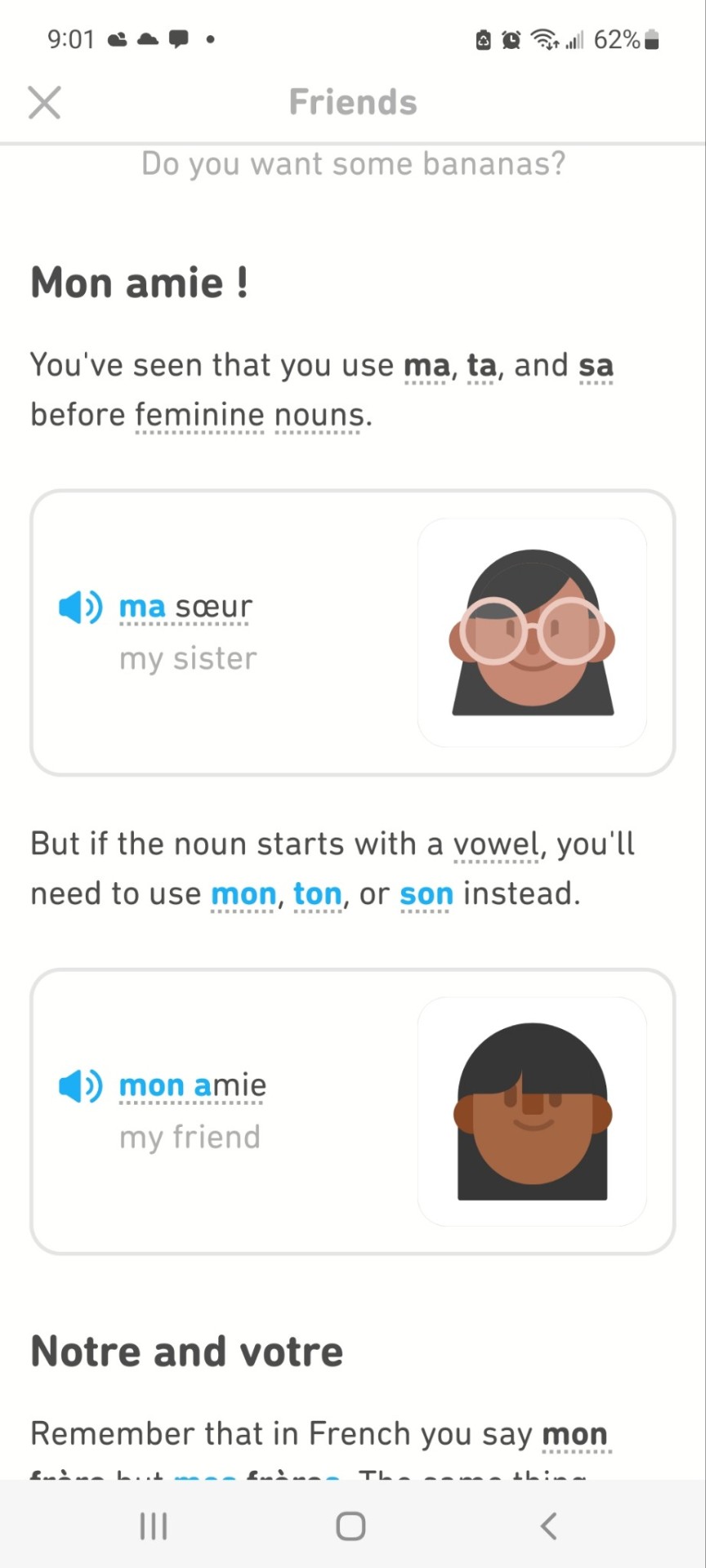#Grammaire
Text
Les déterminants
Les articles
#1. Indefinite articles (unknown noun)
Un (masculine sg) > j'ai une chienne - I have a dog
Une (feminine sg) > j'ai un chat - I have a cat
Des (plural) > il y a des oiseaux dehors - there are birds outside*
#2. Definite articles (known noun)
Le + consonant, L' + vowel (masc sg) > le dîner est servi - dinner is served
La + consonant, L' + vowel (fem sg) > la table est prête - the table is reay
Les (plural) > les invitées sont là - the (female) guests are here
#3. Partitive articles (portion of the noun, not all of it)
Du > je vais prendre du café - I'm going to get coffee
De la > je voudrais de la salade - I would like some salad
Des > le matin je mange des céréales - In the morning I eat cereals
*Des becomes De 1/ when there is an adjective before the noun > tu as de beaux yeux - you have got nice eyes or 2/ in negative sentences > je n’ai pas de chaussettes - I don’t have socks.
N.B. When attached to prepositions à or de, le and les become contracted articles: au (à + le), aux (à + les), du (de + le), des (de + les): au clair de la lune - in the moonlight, j’ai des allergies - I have allergies.
*
Les déterminants possessifs
#1. For a single owner
Mon, ton, son (masculine singular) - my, your, his > mon chat est blanc
Ma, ta, sa (feminine singular) - my, your, her* > sa chienne est noire
Mes, tes, ses (plural) - my, your, their > son lapin est gris
*When a feminine noun following a possessive determiner starts with a vowel, we use the masculine version > c'est mon amie - she's my friend.
#2. For several owners
Notre, votre, leur (singular) - our, your, their > notre chien est vieux
Nos, vos, leurs (plural) - our, your, their > leurs chats sont jeunes
N.B. French focuses on the gender of the property > c’est son chien - it's his/her male dog (there is no information given about the owner).
*
Les déterminants démonstratifs
Demonstrative determiners (from verb montrer - to show, point at) are used to point out the thing or person that is being talked about. They all start with the letter C (mnemonic: here's what I want you to "see").
Ce + consonant, c' + vowel (masc singular) - this > cet arbre est grand
Cette (fem singular) - this > cette maison est immense
Ces (plural) - these > ces fenêtres sont en bois

Les déterminants exclamatifs et interrogatifs
Quel (masculine singular) > quel est ce bruit ? - what is that noise?
Quelle (feminine singular) > quelle belle maison ! - what a beautiful house!
Quels (masculine plural) > quels drôles d'oiseaux ! - what peculiar people!
Quelles (feminine plural) > tu vas acheter quelles chaussures ? - which shoes are you getting?
NB. In front of a stative verb (être, rester, sembler...), those determiners become modifiers and therefore agree with the noun they are referring to > quelle était sa surprise quand je suis arrivée ! - what great was her surprise when I arrived!
Les déterminants indéfinis
Indefinite determiners are used when the object is vague or unknown, can come with another determiner (les quelques - the few) or be locutions formed by a quantity adverb and the preposition de. Some are invariable. They can express:
A non existent quantity: aucun-e - no(ne), pas de - no > Tu n'as fait aucun effort !
A quantity of one: chaque* - each, n'importe quel-le - any
A quantity slightly over two: un peu de - a little of, quelques - a few, plusieurs - several, certain-es - some, d'autres - some others (works with certains)
A large quantity: beaucoup de - a lot of, trop de - too much of, la plupart de - most of suffisamment de - enough of, tant de - so much, différent-es - many, divers-es - various, énormément de - a great amount of
Everything: tout, toute, tous, toutes > Tu as mangé tous les chocolats !
*Chaque is not very common except in à chaque fois (every time), one would typically use tous with a plural (tous les jours, not chaque jour).
N.B. It's always beaucoup de. Beaucoup des is sinful and punishable by death.
*
Les déterminants cardinaux numéraux
Cardinal determiners express a quantity and take the place of an article. They are invariable (can't agree in gender or number) except for one (un, une) + twenty and hundred that get an -s when there's no other number after (vingt, cent: cent-trois but deux cents) + thousand, million, billion that can be pluralised (millier, million, milliard)
*
L'article zéro (physically absent but theoretically present)
#1. Proper nouns
Je vis à Paris (works for cities and islands),
C’est Noël (holidays),
Je l'ai vu sur Facebook (brands),
Tu as rencontré Isabelle (first and last names)
#2. Regular nouns
Des livres pour enfants, des croquettes pour chats (categories),
Pierre qui roule n’amasse pas mousse (proverbs),
Hommes, femmes, enfants (enumeration),
Avoir faim, sans crainte, homme de loi (locutions),
Elle part vendredi (about something happening a particular day),
Appartement à vendre, sel de mer (signs, labels),
Céline Dion, reine du metgala (apposition)

Movie: La Jetée - Chris Marker, 1962 (inspo for Terry Gilliam's Twelve monkeys)
Other posts: is it les or des?
207 notes
·
View notes
Text

#meme#french#french memes#memes#funny shit#I am sorry#But this only works in french#😥#funny memes#grammar#grammaire#writer#writer memes#french writer#I really hope that the french side of tumblr will find this#français#blagues#blague française
9 notes
·
View notes
Text
#grammaire#french#upthebaguette#french side of tumblr#frenchblr#what the france#tumblr français#frenchposting#languages#polls#my poll#sondage#sondages
91 notes
·
View notes
Text
youtube
Bonjour, et bienvenue dans une nouvelle vidéo !
Aujourd'hui nous allons voir comment reconnaître une question en français :
🔹 À l'écrit
🔹 À l'oral
🔹 Thème / Vocabulaire : demander de l'aide
des explications et un exercice pour vous entrainer ! 🇫🇷
🇫🇷 → Comment cela se passe t-il dans votre langue ? Y a - t-il des différences entre les phrases déclaratives et interrogatives ? Des différences à l'écrit et à l'oral ? 🗪
🇬🇧 → How is it in your native language? Are there differences between sentences and questions ? Differences in writing and speech?
Écrivez vos réponses en commentaire 🗯️✍️
Write your answers in the comment section!
À bientôt pour de nouvelles vidéos ! 😊
#French#Français#Prononciation#Pronunciation#Help#French learners#French language#tips#astuces#exercice#exercises#activity#Französisch#Aussprache#writing#grammaire#grammar#Practicing#question#speech#forfrenchlearners#Learning#Language Learning#Youtube
12 notes
·
View notes
Note
if I order/command someone in French will I say “tu marches” or “tu marche”
Hi!
You actually would omit the "tu" altogether, and just say "marche" :)
Orders and commands use the impératif which doesn't require the use of pronouns, since it's only used with tu, nous and vous, all of which have distinct conjugations that allow people to know who it refers to.
The endings for the verbs in impératif are:
For verbs in the first group (regular verbs ending in -er):
(tu) -e -> e.g. marche, aime, visite
(nous) -ons -> e.g. marchons, aimons, visitons
(vous) -ez -> e.g. marchez, aimez, visitez
For verbs in the second group (regular verbs ending in -ir):
(tu) -is -> e.g. finis, agis, accomplis
(nous) -issons -> e.g. finissons, agissons, acomplissons
(vous) -issez -> e.g. finissez, agissez, accomplissez
For verbs in the third group (irregular verbs ending in -ir, -re, and -oir):
(tu) -s -> e.g. cours, mets, vois
(nous) -ons -> e.g. courons, mettons, voyons
(vous) -ez -> e.g. courez, mettez, voyez
Other verbs in the third group are conjugated a bit differently, such as faire and aller:
Faire: fais, faisons, faites
Aller: va, allons, allez
This ended up being a bit longer than expected but hopefully it helps!
13 notes
·
View notes
Text
Louper le coche — #lexpressiondumardi 186/52
Bonjour, soyez les bienvenus pour la cent quatre-vingt-sixième édition de #lexpressiondumardi ! Elle vous présente l’expression familière “Louper le coche”.
Continue reading Untitled

View On WordPress
#lexpressiondumardi#embûches de la langue française#expression écrite#expressions#FLE#gramemo#grammaire#grammaire française#langue française#vocabulaire
4 notes
·
View notes
Photo

23 juillet 1692 : mort de l’historien et grammairien Gilles Ménage ➽ http://bit.ly/Gilles-Menage Une mémoire remarquable, jointe à une grande avidité de savoir, et qui dominait toutes ses autres facultés, semblait l’appeler de préférence aux succès de l’érudition, vers laquelle se portait encore presque exclusivement le génie littéraire
#CeJourLà#23Juillet#Ménage#Historien#Grammairien#Grammaire#Langue#Française#Français#Biographie#histoire#france#history#passé#past#français#french#news#événement#newsfromthepast
2 notes
·
View notes
Text
voici un guide de grammaire inclusif, il inclus des neopronoms populaires !
#resources#language learning#langblr#french language#languages#frenchblr#french langblr#francais#french#inclusive language#grammaire#grammaire inclusif#leo posts
7 notes
·
View notes
Text
the sexual tension between my ability to write a contextual statement with improper punctuation, capitalization and subject-verb agreement vs. the urge to buy a grammar book.
#dark academism#dark academia#studyblr#writing#spilled thoughts#writeblr#random musing#rambles#academia#grammaire#grammatik#books and reading#writing and stuff#language#literature#academia thoughts#ramblings#tension
3 notes
·
View notes
Video
youtube
“[...] on ne peut pas parler de langue sans parler de société.”
1 note
·
View note
Text
Les autres pronoms
Possessive pronouns (mine, ours)
Masc. sg.: le mien, le tien, le sien, le nôtre, le vôtre, le leur
Fem. sg.: la mienne, la tienne, la sienne, la nôtre, la vôtre, la leur
Masc. pl.: les miens, les tiens, les siens, les nôtres, les vôtres, les leurs
Fem. pl.: les miennes, les tiennes, les siennes, les nôtres, les vôtres, les leurs
Ex: tu pensais que tu avais pris tes lunettes mais c'étaient les miennes - you thought you had taken your glasses but they were mine
Demonstrative pronouns
They replace demonstrative determiners followed by a noun
They can be one of three types: prepositional (c'est celle de Laure - it's Laure's), relative (les robes en soie sont celles que je préfère - silk dresses are the ones I prefer), or nominal (j'ajoute à cette lettre celle de mon fils - I add to this letter the one of my son).
Singular - celui (m), celle (f): celle en bleu - the blue one
Plural - ceux (m), celles (f): ceux-là sont mieux - those are better
Neutral - ceci - this (rare), cela - that, ça - this (short for cela): ça ira - that will be fine, c’/ce*: c’est un chien - this is a dog, ce sont des chats - those are cats
N.B. Adverbial particles -ci (short for ici) and -là are added to indicate the distance. Celui-ci means this one (close), celles-là those ones (far away).
*Do not mix up the masculine singular demonstrative determiner ce that is followed by a singular masculine noun (ce chat est blanc - this cat is white) and the demonstrative pronoun ce that is followed by est/sont (is/are) or a relative pronoun (c'est ce qu'il m'a dit - that is what he told me; ce sont les chaussures qu'il a choisies - those are the shoes he chose)
N.B. C'est is used with a noun: c'est un gentil garçon - he's a nice boy, an adverb: c'est si joli - it's so pretty, or a masculine singular adjective when talking about a situation or activity: c'est facile - it's easy. Il/Elle est is used with adjectives when talking about living beings or things: elle est grande - she's tall, in expressions: il était une fois - there one was, before a past participle: elle est partie - she's gone.

Relative pronouns
Relative pronouns represent the nouns placed in front of them
Que/qui
subject (qui), when talking about living beings or things and describing them, placed before a verb: la fille qui porte un pull rouge aime la glace - the girl that is wearing a red jumper likes ice cream
indirect object (qui), when talking about people, after a preposition, placed before either a determiner and a noun or a pronoun (la fille à qui tu as parlé aime la glace - the girl you talked to likes ice cream)
direct object (que), when talking about living beings or things, placed before either a determiner and a noun or a pronoun (la fille que tu aimes aime la glace - the girl you love likes ice cream)
Quoi
object, when talking about things, often vague (something, nothing): c’est ce à quoi j’ai pensé toute la journée - that is what I thought about all day long
Dont
possessive phrase (complément de nom): je bois dans une tasse dont la anse est cassée - I’m drinking from a mug that has a broken handle
indirect object, equivalent of "of which": le livre dont je t’ai parlé est sorti - the book I told you about is out
adjective object: les filles sont allées à un concert de Rihanna, dont elles sont fan: the girls have gone to a Rihana’s concert, whom they are fans of
Où
adverbial phrase of place: la chambre où je dors est la plus grande de la maison - the room I sleep in is the biggest in the house
adverbial place of time: septembre est le mois où je suis née - September is the month in which I was born
Compound relative pronouns
Auquel, duquel, lequel (marriage of prepositions à, de, le and of simple relative pronouns)
subject - rare, literary: j’ai appelé ma mère, laquelle m’a informée de ton accident - I called my mum who told me about your accident)
object, about things or animals: les chaises sous lesquelles je suis cachée sont en bois - the chairs under which I am hidden are made of wood; c’est l’endroit duquel il est parti - this is the place from which he left; les hommes auxquels elle parle sont allemands - the men she is talking to are German
Neutral relative pronouns
They are built by adding ce, which can be roughly translated as "the thing", to dont, que, qui and used when the antecedent isn't mentioned or when it's a clause often after a comma.
Ce qui is the subject of the verb that follow: je ne sais pas ce qui est tombé - I don’t know what fell down (word by word I don't know the thing that has fallen), j’ai eu un accident, ce qui explique pourquoi je suis en retard - I got in an accident, which explains why I’m late
Ce que or ce qu' is used as a direct object and is generally followed by a subject and a verb: ce que je te demande, c’est d’être à l’heure - what I’m asking you is to be on time (word by word the thing that I ask of you it is to be on time), c’est ce que je voulais dire - that’s what I meant
Ce dont is used as the preposition de’s object: ce dont j’ai peur, c’est qu’il revienne - what I'm afraid of is that he will come back (word by word the thing of which I'm afraid, it is that he comes back), c’est précisément ce dont je veux te parler - that is precisely what I want to talk to you about
N.B. To stress a point, we can use ce qui/que/dont + c’est/ce sont: ce qui me plaît le plus, c’est ta robe - what I most like is your dress.

Movie: Pierrot le fou - Jean-Paul Godard, 1965
214 notes
·
View notes
Text

C'est pas "ayant" normalement ???? J'ai un gros doute maintenant
6 notes
·
View notes
Text
Senghor s'éteignait il y a 21 ans et fait la couverture d'un Bescherelle consacré à l'histoire de la langue française
Senghor s’éteignait il y a 21 ans et fait la couverture d’un Bescherelle consacré à l’histoire de la langue française

View On WordPress
#académicien#éditions Hatier#Bescherelle#dakar#francophonie#grammaire#Jior#Langue française#Léopold Sédar Senghor#maison Senghor#normandité#poète#poète français#président du Sénégal#sénégal#sérère#Verson
2 notes
·
View notes
Text
bon matin! happy tuesday! today I have a quick how-to for forming the imperfect tense (or l’imparfait in french!) enjoy <3
my favourite thing about the imperfect tense in french is that once you get the hang of it, it’s really easy to use! there’s just three steps to it:
• take the « nous » form of the present tense |
• drop the « nous » and « -ons » from the end |
• choose a subject pronoun of your choice and add it’s corresponding ending |
here are the corresponding endings for all the subject pronouns~
je - ais
tu - ais
il/elle/on - ait
nous - ions
vous - iez
ils/elles - aient
whilst there are some exceptions to the rule, this is a good starting point. have fun with this new tense! good luck in your studies, everyone <3
#cinnamon’s french posts#français#french#frenchblr#langblr#french vocab#vocabulaire français#language learning#polygot#grammar#grammaire
5 notes
·
View notes
Text

Des questions ? Do you have questions ? 💭
Lauve.french
#lauvefrench#mistakes#french#language#frenchlearners#french learning#learning tips#francais#common mistakes#how are you?#questions#phrases#grammar#french grammar#vocabulary#grammaire
5 notes
·
View notes
